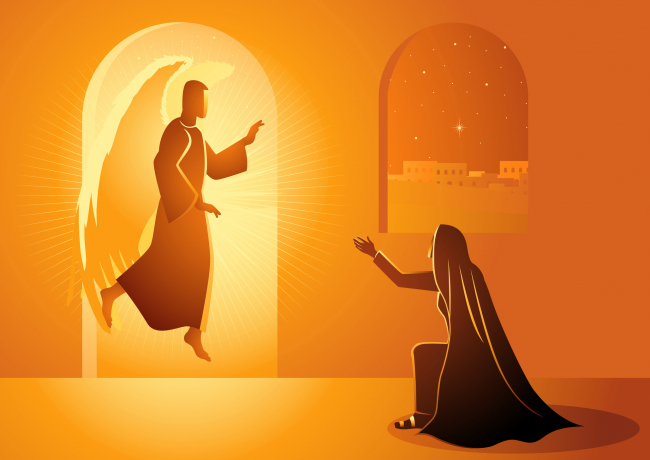• Daniel Baker
Posted in Advent

This Sunday for Advent we’ll listen as John Donne’s “Annunciation” is read. As with all (good) poetry, the lines and phrases have a depth hard to take in at the speed of a reading. And when the poetry is exploring the Incarnation itself, this means the depth is unfathomable. For that reason we wanted to give you a chance to look at the poem before it’s read.
To give you just a little background, John Donne (1572–1631) was an Englishman who grew up in a Catholic family in a day when the Protestant Queen Elizabeth reigned in England.[1] His Catholicism is the reason he attended Oxford but did not take a degree. Eventually he left the Catholic faith and at 43 became an Anglican clergyman. His preaching drew large crowds.
His poetry went unpublished in his lifetime. He would typically write his poems but then give the handwritten copies to friends and family. Derisively labelled a “metaphysical poet” concerned only with obscure ideas and not more familiar ones, his poetry endured centuries of disfavor. In time, however, he would come to be regarded as one of England’s finest. His religious and romantic poetry attempts to compress the largest of ideas into the tightest of words. Donne is the author of the famous line, “No man is an island.”
In “Annunciation” he is reflecting on Gabriel’s announcement to Mary, “You will conceive in your womb and bear a son, and you shall call his name Jesus. He will be great and will be called the Son of the Most High” (Luke 1:31–32). The angel lets Mary know the child in her womb is somehow both her son and “Son of the Most High.” That mystery is what Donne explores in “Annunciation”:
Salvation to all that will is nigh;
That All, which always is all everywhere,
Which cannot sin, and yet all sins must bear,
Which cannot die, yet cannot choose but die,
Lo, faithful virgin, yields Himself to lie
In prison, in thy womb; and though He there
Can take no sin, nor thou give, yet He will wear,
Taken from thence, flesh, which death's force may try.
Ere by the spheres time was created, thou
Wast in His mind, who is thy Son and Brother;
Whom thou conceivest, conceived; yea thou art now
Thy Maker's maker, and thy Father's mother;
Thou hast light in dark, and shutt’st in little room,
Immensity, cloister’d in thy dear womb.[2]
Donne opens with the announcement of good news soon to be fulfilled: “Salvation to all that will is nigh.”
And then is a deep look at the person of Christ. He is “that All” who is eternal and omnipresent (“always is all everywhere”). And then his human and divine natures are compared along several lines. With respect to sin, he “cannot sin” but “all sins must bear.” With respect to death, he “cannot die” but “cannot choose but die.”
Most of the poem looks at Mary herself and “thy dear womb.” Christ is presented as yielding “Himself to lie in prison” in her womb. Though he is in this normal human mother, Christ will not receive from her the original sin we all receive at conception—“can take no sin, nor thou give.” But, he will receive “flesh,” which will enable him to experience “death.”
Then there is the marvel that Mary’s Son is also Mary’s God: Before “time was created,” Mary “wast in His mind.” Mary “conceivest” Jesus in a sense, but in eternity past Mary herself was “conceived” by the Son of God. The result is that Mary is “thy Maker’s maker” and “thy Father’s mother.” In these verbal riddles are hidden profound depths.
He ends the poem looking again at Jesus in the womb. Mary “hast light in the dark” (the light of the world!), and in the “little room” of her womb is “immensity, cloister’d in thy dear womb.”
Donne helps us see how right on point is Mary’s question: “How will this be?” (Luke 1:34). There can be no answer other then one Gabriel gives: “Nothing will be impossible with God” (v. 37).
May John Donne help you marvel even more at this Christmas mystery.
Daniel
[1] This background is from Adam Kirsch, “John Donne’s Proto-Modernism,” The New Yorker (Oct 10, 2022).
[2] Cited in Malcbom Guite, Waiting on the Word: A Poem a Day for Advent, Christmas, and Epiphany (Canterbury, 2015), 13).
